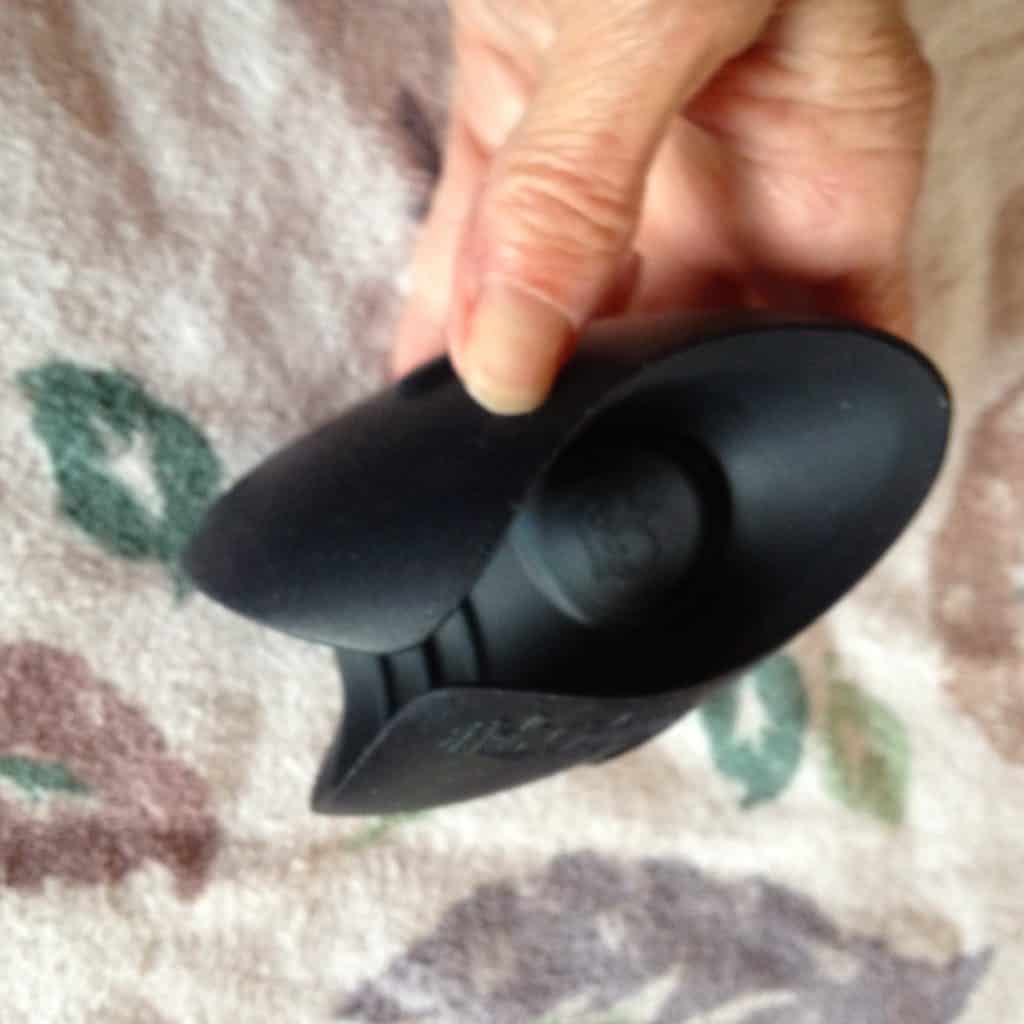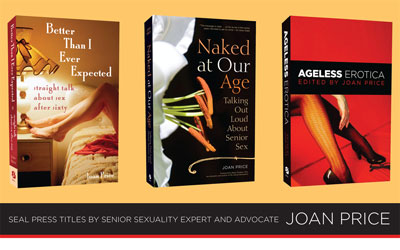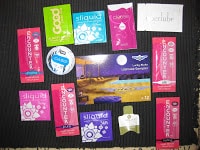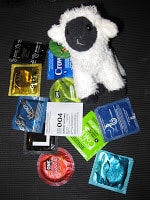Posts Tagged ‘lubricants’
Sexy Seniors’ Holiday Gift Guide 2014

Searching for a sexy gift for your lover or yourself?
2014 has been a great year for innovative sex toys! Here are my favorites from December 2013 to December 2014:
 Palm Power: New favorite vibrator! Drum roll, please: Introducing the Palm Power, a lightweight, ergonomically designed product that packs so much power into a small, silicone topped vibrator that it jumped to #1 on my personal Hit Parade the first time I used it. And the second time. And… you get the picture. I continue to be amazed at how a vibrator this small can deliver such intense vibrations. With the different caps available, this vibrator is versatile for any gender body.
Palm Power: New favorite vibrator! Drum roll, please: Introducing the Palm Power, a lightweight, ergonomically designed product that packs so much power into a small, silicone topped vibrator that it jumped to #1 on my personal Hit Parade the first time I used it. And the second time. And… you get the picture. I continue to be amazed at how a vibrator this small can deliver such intense vibrations. With the different caps available, this vibrator is versatile for any gender body.Doxy – a power tool: Oh my. I wouldn’t have imagined that a vibrator this strong existed. I don’t even need to take it to the highest power setting to send me spinning into space. Even the low settings are strong and they’re rumbly rather than buzzy. A really strong wand vibrator. If you or your loved one needs extra power, Doxy delivers.
Men, you’ll love the Pulse! Presenting… The Pulse, a pulsing, oscillating, amazing vibrator for men that does not require an erection for his pleasure! That’s right — unlike other vibrating “sleeves,” the penis does not have to be hard to start enjoying it. Spread open the flexible flaps, rest your penis in it, turn it on, and enjoy the sensations. The Pulse is the perfect gift for the penis in your life.
Iroha: Cutest Vibrators Ever. The Iroha Rechargeable Silicone Vibrators, available in three styles and shapes, are adorable and cushy. I want to cuddle and squeeze them. And yes, they’re dynamic little vibrators — though not turbo power. The vibrator has a cushy layer, covered by a body-safe silicone skin. It’s not soft through and through (there’s a motor in there) — just a layer — so you can press firmly and feel just a little cushioning, or press lightly, and it all feels soft. Delightful.
 Minna Limon: Cute, Squeezable Vibrator. I like my new Minna Limon so much that I’m starting to think of it almost as a pet rather than a product. It’s cute, touchable, squeezable, fun to play with, and responsive. But no, it’s not a pet — it’s a vibrator, and it’s a delight. This is a great gift for a loved one, a pal, or yourself. It works like this: Power it on with the button, then squeeze the sides of the Limon. The harder you squeeze, the stronger the intensity, though it never gets super strong.
Minna Limon: Cute, Squeezable Vibrator. I like my new Minna Limon so much that I’m starting to think of it almost as a pet rather than a product. It’s cute, touchable, squeezable, fun to play with, and responsive. But no, it’s not a pet — it’s a vibrator, and it’s a delight. This is a great gift for a loved one, a pal, or yourself. It works like this: Power it on with the button, then squeeze the sides of the Limon. The harder you squeeze, the stronger the intensity, though it never gets super strong.  Original Magic Wand + Accessories. The Magic Wand has been around since the 1970s, almost as long as I’ve been having vibrator-assisted orgasms, and it’s been responsible for a good many of them. It was called the Hitachi Magic Wand until recently. (I reviewed it here.) Now, after Hitachi sold distribution rights to Vibratex, it’s the Original Magic Wand. So the new Magic Wand is called the “original,” and it’s as strong as ever — and much less pricey than most quality sex toys.
Original Magic Wand + Accessories. The Magic Wand has been around since the 1970s, almost as long as I’ve been having vibrator-assisted orgasms, and it’s been responsible for a good many of them. It was called the Hitachi Magic Wand until recently. (I reviewed it here.) Now, after Hitachi sold distribution rights to Vibratex, it’s the Original Magic Wand. So the new Magic Wand is called the “original,” and it’s as strong as ever — and much less pricey than most quality sex toys.- An elegant bottle or refillable case of Überlube, a superbly comfortable, slick, long-lasting, silicone lubricant. (Fine with condoms, not with silicone sex toys.) You can even use it to style your hair or eliminate chafing during sports.
- Condom sampler from Lucky Bloke: great variety, including some brands you’ve never heard of. And don’t you want to do business with a company whose motto is “Have more sex and save the world”?
- Blossom Organics Natural Moisturizing Lubricant or Warm Sensation Lubricant, pH balanced for female bodies. (Fine with condoms and with silicone sex toys.) If she likes arousal gels, the Pure Pleasure Arousal Gel is, as it claims, pure pleasure, adding an extra tingle!
Condom, Lube Giveaways from Lucky Bloke

Update: Although the contest is closed now, I hope you’ll read the interesting info below, including how to choose the right size condom!
What do you do to make safer sex sexier? How does it enhance your sexual enjoyment rather than interfere with it? What is your safer sex policy with new lovers or with non-exclusive partners?
Answer any of these questions and you can win free condoms or lube and dental dams!
I’m teaming together with Lucky Bloke, a condom subscription service offering more options than you thought possible, to find out what you think about safer sex and to reward two lucky people age 50+ with gift samplers of condoms or lubes!
An empty toilet paper roll easily measures the erect penis of your choice. Click here.
• if there’s extra room = SMALLER / MORE TAILORED FIT CONDOMS (best fit for 35% of men)
• just enough room = MEDIUM / STANDARD FIT CONDOMS (best fit for 50% of men)
• if it’s too tight = LARGER / GENEROUS FIT CONDOMS (best fit for 15% of men)
 Whichever contest you’re entering, if you’d like some dental dams for safe cunnilingus, let me know that you’d like those included if you win one of the prizes. Dental dams aren’t just for the dentist’s office — they are latex squares large enough to fit over a woman’s entire genital area with room to spare so that there’s no exchange of body fluids during cunnilingus. I know, they look funny, but they feel fine and don’t interfere at all with the pleasure–take my word for it!
Whichever contest you’re entering, if you’d like some dental dams for safe cunnilingus, let me know that you’d like those included if you win one of the prizes. Dental dams aren’t just for the dentist’s office — they are latex squares large enough to fit over a woman’s entire genital area with room to spare so that there’s no exchange of body fluids during cunnilingus. I know, they look funny, but they feel fine and don’t interfere at all with the pleasure–take my word for it!
- What makes safer sex (including condoms/ dental dams/ non-penetrative sex) sexy as well as smart at our age?
- How do you make barrier protection sexier, more fun, and an enhancement of hot sex?
- What is your personal safer sex policy with new lovers or with non-exclusive partners, and why?
3. In your email, include your name, age, email, and mailing address (does not have to be in the US!), and tell me whether you want the condom sampler or the lube sampler and whether you’d like dental dams included if you win.
 The best two responses will receive samplers directly from Lucky Bloke, sponsors of this contest, and will be published here and in The Ultimate Guide to Sex after Fifty, to be published by Cleis Press early in 2015. At Joan’s discretion, more of your comments may be used in the book, as well.
The best two responses will receive samplers directly from Lucky Bloke, sponsors of this contest, and will be published here and in The Ultimate Guide to Sex after Fifty, to be published by Cleis Press early in 2015. At Joan’s discretion, more of your comments may be used in the book, as well.
You may enter by commenting here, but please also email me the info above (#3) so I can notify you if you win.
Contest is closed, thank you!
Note from Lucky Bloke to you:
Discretion and ethical business practices are paramount at Lucky Bloke. We only use our customer’s information for shipping their orders. Everything is shipped discretely and personal information is never shared or made public anywhere.
Vaginal dryness and senior sex orgy? Reader Q
Q: I have recently started to have a physical relationship with a more mature woman. She happens to be 12 years my senior. I normally use lubricant because she is normally dry, regardless of how much foreplay we engage in. She has approached me about engaging in a small orgy. We were wondering if there would be any issues with a few men?
My response:
It’s completely normal for women to need lubricant for sex as they age. A woman can be extremely aroused and still not lubricate the way she used to. You’re right to use lubricant, as you’ve discovered already. Prolonged intercourse – whether with one man or “a few” – will require frequent application of lubricant.
Besides the dryness, though, she may find the group sex she’s considering physically uncomfortable sooner than she expects because of the thinning of her vaginal walls. If you plan to go ahead with this scene, be sure everyone understands that not every sex act has to culminate in intercourse, and make sure the other men involved agree not to push that part of it.
 For everyone’s health and safety, be sure that condoms and dental dams (or the female condom, which works for both uses) are within easy reach and used with every interaction. Don’t forego this because the other men insist that they are “safe.” Your sexual health and your partner’s are your own responsibility. (Please read the FAQ, “Six Basic Facts Seniors Need to Know about STIs”)
For everyone’s health and safety, be sure that condoms and dental dams (or the female condom, which works for both uses) are within easy reach and used with every interaction. Don’t forego this because the other men insist that they are “safe.” Your sexual health and your partner’s are your own responsibility. (Please read the FAQ, “Six Basic Facts Seniors Need to Know about STIs”)I can’t tell from your question whether your partner has had sex with multiple partners before and wants to do it again, or whether this is a fantasy of hers that you’d like to help her indulge. Don’t go into it lightly. Talk a lot first. Try roleplaying, just the two of you, pretending you have a third (or fourth) by “talking dirty” about what you’re fantasizing is going on. That may help you each understand what you’re imagining and wanting from expanding your relationship.
I could write pages about the issues to think about and talk about, how to negotiate what’s okay and what’s off limits, how to choose and invite new partners, how to test your fantasy in stages, how to make sure your partner (or any of you) can stop or leave if it doesn’t turn out to be right after all, how to care for each other afterwards.
As you see, I’m not moralizing – if you both really want this and it fits with your own beliefs, go into it thoughtfully and with plenty of dialogue and preparation.
If I’ve left you worried, frightened, or dismayed, then maybe this would be too big a step for your relationship to handle.
This question and my response were first published on the Safer Sex for Seniors website where this question was originally submitted — direct link to this Q &A here. Here’s what I wrote about this site when it first went live.
I’d love to know what my readers think about this topic and my response. Please comment!
Fun is Sexy: Making Love Before Making Love
Robert and I had rituals, made-up words, silly secrets, and special games that warmed us with laughter, kept our intimacy strong, and made us feel like we were making love all day long. Silly things, sometimes – like “Panda.”
 Robert and I used to exchange a tiny toy panda with paws that clutched tightly, permitting us to attach it to objects. I’d leave Panda attached to Robert’s shoelace, on his toothbrush handle, under his pillow, peeking out of his bathrobe pocket, even on top of the coffeepot — anywhere he’d find it unexpectedly and enjoy the surprise.
Robert and I used to exchange a tiny toy panda with paws that clutched tightly, permitting us to attach it to objects. I’d leave Panda attached to Robert’s shoelace, on his toothbrush handle, under his pillow, peeking out of his bathrobe pocket, even on top of the coffeepot — anywhere he’d find it unexpectedly and enjoy the surprise.  Then when one of us would find Panda astride our favorite vibrator, or holding onto the lubricant nozzle, or on the pillow, little legs up, we’d understand the special invitation!
Then when one of us would find Panda astride our favorite vibrator, or holding onto the lubricant nozzle, or on the pillow, little legs up, we’d understand the special invitation!








